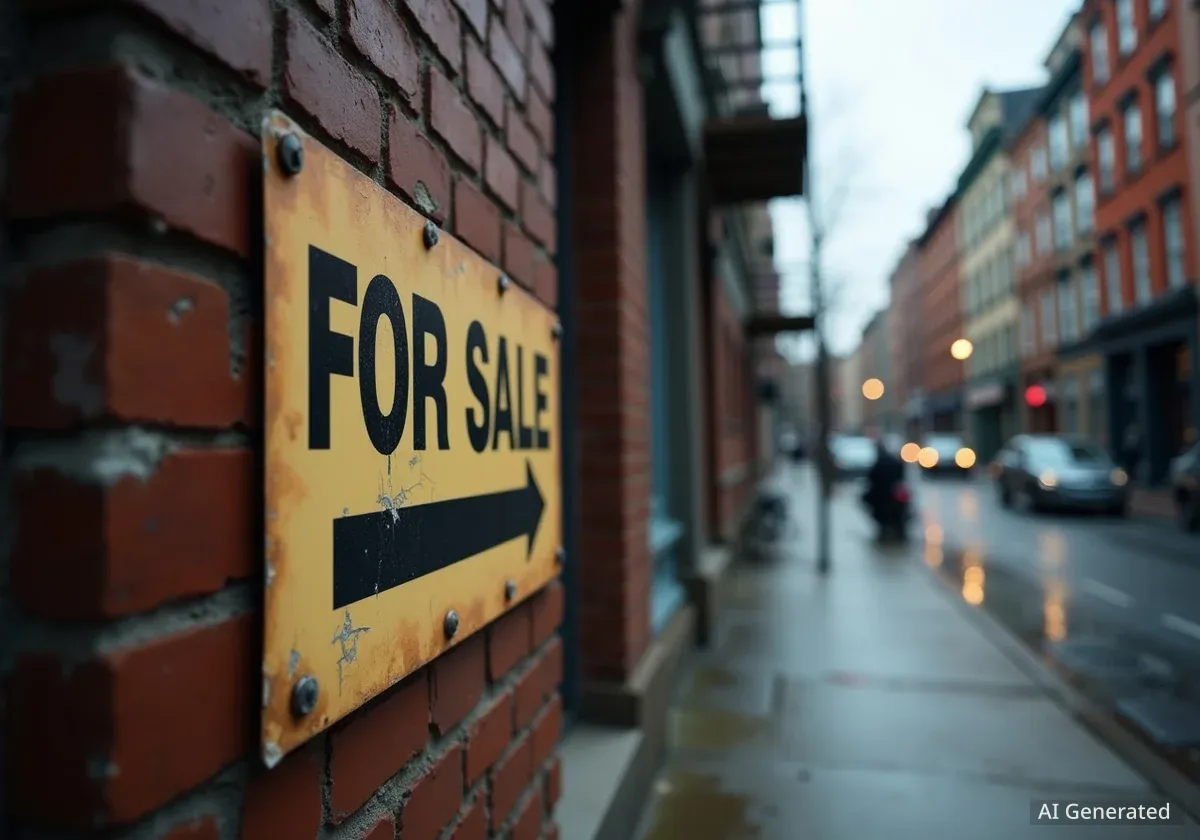Real estate investment firm Aetna Realty has increased its holdings in New York City's Hell's Kitchen neighborhood, acquiring two mixed-use buildings for $18 million. The properties, located at 643 and 647 9th Avenue, are situated at the corner of West 45th Street and contain a total of 23 residential units.
Key Takeaways
- Aetna Realty purchased two adjacent buildings at 643 and 647 9th Avenue in Hell's Kitchen for $18 million.
- The company stated the properties are a long-term investment with no immediate plans for redevelopment.
- The acquisition comes as Aetna faces scrutiny over demolition plans for another property within a protected historic district.
- The deal highlights ongoing tensions in NYC between housing development and neighborhood preservation amid new zoning proposals.
Details of the Ninth Avenue Acquisition
The transaction involves two adjacent walk-up buildings, one five stories and the other six stories tall. Together, they house 23 apartments above ground-floor retail spaces. This purchase significantly expands Aetna Realty's footprint in a neighborhood where it already has a notable presence.
The ground floor of 643 9th Avenue is currently being renovated for a new Georgian restaurant named The History. This space was previously occupied by Southern Hospitality, a barbecue restaurant once backed by Justin Timberlake. Next door, at 647 9th Avenue, the Thai and Vietnamese restaurant Obao has been a long-term tenant for more than a decade.
Aetna's Growing Hell's Kitchen Portfolio
This latest purchase builds on Aetna Realty's existing investments in the area. The firm already owns properties at 715 and 771 9th Avenue. In 2022, Aetna acquired a package of buildings for $10 million that included 404 W50th Street and 729-731 9th Avenue, the latter being the long-time location of Amish Market.
A Long-Term Investment Strategy
Despite the high-value acquisition, Aetna Realty has indicated it does not plan to redevelop the newly acquired Ninth Avenue properties. Ben Braka, Vice President of Aetna Realty, confirmed the company's intentions in a statement.
"Hell’s Kitchen is one of the best neighborhoods in NYC and we’re happy to be a part of it; we’re always looking to expand our portfolio in this true NYC neighborhood," Braka said, describing the purchase as a "long-term hold."
This approach suggests a strategy focused on stable, long-term rental income from both the residential units and the established commercial tenants rather than speculative redevelopment.
Community Scrutiny and Zoning Concerns
While the Ninth Avenue purchase is presented as a stable investment, Aetna's other activities in the neighborhood have drawn attention from community leaders. Earlier this month, the company filed plans to demolish a four-story residential building at 404 W50th Street, intending to replace it with an eight-story, 18-unit apartment building.
This proposal has raised alarms because the property is located within the Clinton Special District’s Preservation Area. According to local zoning regulations, demolition of existing housing in this area is prohibited unless a building is officially declared unsafe by the city.
The Clinton Special District
Established to preserve the unique character of Hell's Kitchen, the Clinton Special District includes specific preservation areas with strict rules against demolition and height restrictions. These regulations are designed to protect the neighborhood's socio-economic diversity and low-rise architectural fabric.
Community Board Pushes for Oversight
Manhattan Community Board 4 (MCB4) has been actively monitoring development in the district and has urged the Department of Buildings (DOB) to improve its system for flagging applications that violate preservation rules. The board fears that non-compliant demolition permits could be approved by mistake.
Paul Devlin, co-chair of the Clinton/Hell’s Kitchen Land Use Committee of MCB4, commented on the delicate balance the community strives to maintain.
"Anybody acquiring properties in Hell’s Kitchen likely knows about our efforts to strike that balance and respects our vigilance in monitoring all development opportunities," Devlin stated. "The Clinton Special District remains a unique part of New York because of the work done by local residents to walk this fine line."
Broader Context of NYC Development
Aetna's activities in Hell's Kitchen are taking place against the backdrop of major proposed zoning changes in New York City, collectively known as "City of Yes." These reforms are intended to stimulate the creation of new housing by allowing for denser and taller construction across the five boroughs.
Supporters argue that "City of Yes" is essential for addressing the city's severe housing shortage. However, critics express concern that the changes could encourage aggressive property acquisition by large developers, leading to the construction of massive projects that might alter the character of historic neighborhoods.
- Proponents' View: Easing zoning restrictions will lead to thousands of new apartments, increasing supply and potentially lowering costs.
- Opponents' View: The reforms could lead to unchecked development, displacement of residents, and the loss of neighborhood character without sufficient guarantees for affordable housing.
A prominent example of the type of development that worries preservation advocates is Extell's 1,200-foot residential tower at 77 W66th Street. To build the supertall structure, the developer assembled an entire block of properties, a process that involved demolishing existing buildings. This project has become a symbol of the potential impact of citywide upzoning on local neighborhoods, fueling the debate over how New York City should manage its growth.





